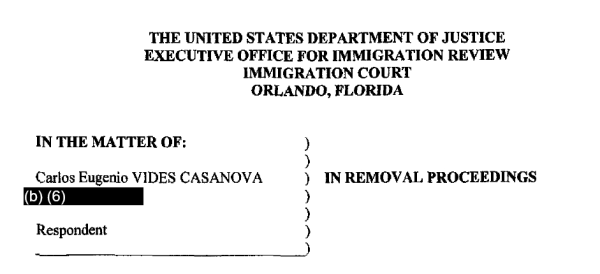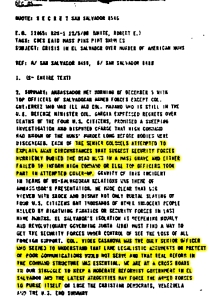Justice Department “Reclassifies Documents,” Fights to Withhold Ground-breaking Immigration Court Decision on El Salvadorian Vides Casanova
UPDATE: 7 May 2013, Department of Justice releases less-redacted version of decision. See less-redacted version of decision here. The New York Times is still waiting on a response to a FOIA request to the DOJ for release of the entire court record of this case including transcripts and expert witness testimony on declassified documents.
 The Department of Justice (DOJ) continues to earn its second annual Rosemary Award for Worst Open Government Performance with its abysmal performance regarding a ground breaking decision in an immigration case of Carlos Eugenio Vides Casanova, former defense minister of El Salvador who is implicated in dozens of cases of torture and extrajudicial execution. To withhold this information from the public the DOJ made up FOIA procedures and erroneously withheld previously declassified information in its misguided attempt to preserve secrecy surrounding the case.
The Department of Justice (DOJ) continues to earn its second annual Rosemary Award for Worst Open Government Performance with its abysmal performance regarding a ground breaking decision in an immigration case of Carlos Eugenio Vides Casanova, former defense minister of El Salvador who is implicated in dozens of cases of torture and extrajudicial execution. To withhold this information from the public the DOJ made up FOIA procedures and erroneously withheld previously declassified information in its misguided attempt to preserve secrecy surrounding the case.
The New York Times filed a FOIA request, numerous appeals, and eventually filed suit against the DOJ, for copies of Judge Grim’s final decision regarding the U.S. Immigration Court case against Vides Casanova. Last week, the New York Times partially won the FOIA case by getting a copy of Judge Grim’s February 2012 decision released, but with redactions. Among the redactions were all of the witnesses’ names, even though it was a public hearing and their names are available thanks to extensive news coverage. Additionally, the expert witness report, which includes hundreds of pages of declassified U.S. documents obtained by the National Security Archive and used as evidence in the court is being held from the public as “confidential.” These documents remain confidential despite the fact that they were released through the FOIA and through President Clinton’s executive orders for declassification in response to the El Salvador Truth Commission request.

Example of “reclassified” document – Reports meeting of Ambassador White and leaders of El Salvador Armed Forces during which officers attempt to deny military involvement in and subsequent cover-up of American churchwomen killings. See full document here.
Here is the chronology of the New York Times battle to get the written decision of a public trial released:
- September 2012 – NYT submits a FOIA for the full release of both decisions written by Judge Grim in February and August of 2012.
- October 2012 – DOJ denies request claiming that the decisions were “preliminary,” and the agency had not issued a final agency decision. The DOJ also cited personal privacy concerns. [This is absurd. The hearing was public, and the general outline of the decision was made public in February of 2012, while the details were withheld.]
- November 2012 – NYT files an administrative appeal, arguing that it knew “nothing about the FOIA exemption determination that would turn on the absence or existence of a final decision,” arguing that the denial was improper.
- January 2013 – DOJ denies the appeal, simply citing the B6 exemption, making no reference to whether the decisions were preliminary or not.
- February 2013 – NYT submitted a letter to the DOJ stating that the denial of access is contrary to the First Amendment and common law rights of access.
- April 2, 2013 – NYT files suit against the DOJ in the District Court of New York after receiving no response to February letter.
- April 4, 2013 – DOJ responds to February letter without mention of lawsuit, treating the February letter as “request for reconsideration” (which does not exist as a procedure of the FOIA) and releases a redacted version of Judge Grim’s February 2012 decision.
The DOJ is the agency in charge of enforcing the FOIA. How can the DOJ appropriately enforce the FOIA if it does not follow the FOIA itself? This is also especially worrisome considering the rosy report on the state of FOIA presented by Melanie Pustay, director of the Office of Information Policy at DOJ.
Why this all the more important…
Carolyn Patty Blum, a human rights attorney of the Center for Justice and Accountability explains that “this [Vides Casanova] may be the highest military commander of any country” who has been subject to a new law stating that a commander can be ordered removed from the United States, if he has “ordered, assisted or participated in torture or extrajudicial killing. Key to the ruling is that it is sufficient to know or have reason to know about the acts of subordinates and then fail to prevent or punish those acts.” The New York Times reports that this is the first time that a high-ranking foreign military commander will be deported under the new human rights violations law which was passed in 2004.
This is also the first time to have a ruling about very specific cases of torture, extrajudicial killings and/or disappearance. Judge Grim’s finding that General Vides Casanova “assisted or otherwise participated” in the killing of four churchwomen is probably the best known case in the US.
The implications that this case has on the human rights world are huge, and important precedents have been set – all the more important that the DOJ moves to release the report in its entirely, along with expert witness reports and accompanying documentation, rather than going out of its way to act contrary to DOJ’s very own Attorney General Eric Holder’s memo calling agencies to act with a “presumption of openness.”
Trackbacks
- El Salvador: Informe mensual abril del 2013 |
- El Salvador Update: April 2013 / Informe mensual abril 2013 |
Comments are closed.

Is this a Contra-gate thug and CIA proxy warrior?
So, this IS a Contra-gate thug and CIA proxy warrior!
Funny how you should mention that a request for reconsideration does not officially exist in FOIA. Once in a while I have found it useful when an agency has clearly missed something in an appeal to file a “request for reconsideration” pointing out the critical error or oversight. It’s basically an informal thing you can use to try and say “Are you sure you want to go down this road? Here’s one last chance to fix this mistake before we sue you.” Sometimes it even works and the agency changes its mind.
Then there’s the CIA. They made a clearly erroneous ruling on a fee waiver, and it was clear from their appeal denial letter that they had misunderstood our argument. So I write to them and say “Please reconsider your appeal decision. Here’s where you misunderstood the argument. We didn’t say X, we said Y.”
Their response was a marvel of bureaucratic form over function. “Please be advised that [your client’s] request for a fee waiver was denied for the reasons cited in our 23 October 2012 letter, and that there are no provisions in our regulations for a reconsideration of his request.” In other words, even if they clearly made a mistake, if they don’t have a reg allowing them to fix it, their hands are just tied, poor babies. Because you know they’re all about following their FOIA regs to the letter.
Did I really expect them to change their minds? Not really. But I will admit I expected them to re-affirm their decision, not say they couldn’t reconsider it because they didn’t have a reg for that. That’s just silly.
It does make you wonder, though, what their statutorily mandated Public Liaison does, if nobody in their FOIA office can do anything not explicitly delineated in regs. I would imagine it would be hard to resolve problems requesters have with the FOIA request process if you’re not allowed to do anything like reconsider an erroneous decision. (It’s also curious that they somehow manage to reverse their final appellate positions when it looks like they’re about to lose a court case, despite having no regs for that. Like, true story, releasing a stack of records as a “final response” after a Glomar response which was affirmed on appeal before we filed suit.)
(If you’re wondering what this has to do with this DOJ case, it’s merely me pointing out that there are stupider things that agencies can do than misinterpreting something as a request for reconsideration, like saying they can’t accept requests for reconsideration.)